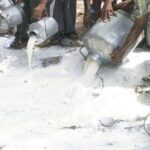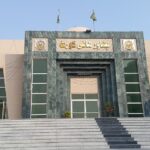ISLAMABAD, June 12 (APP):Pakistan’s tax-to-GDP (gross domestic product) ratio, the key indicator of fiscal strength, remained stagnant over the past 20 years and at present stands at 11 percent, which is the lowest among emerging countries.
To improve the situation, the government initiated a reform process, comprising of a holistic strategy combining policy and administrative reforms to eliminate the distortions and boost quality revenue collection, Federal Minister for Industries and Production Hammad Azhar said while unveiling the federal budget for the fiscal year 2020-21 in the National Assembly on Friday.
He said key achievements had been made during the current fiscal year, including historical trend of Pakistan’s import-led growth replaced with high domestic-led growth and unprecedented refunds issued which were 119% higher than last year
He said the narrow tax base had been expanded by bringing retailers into the tax net, and successful installation of Point of Sales (POS) system at 6,616 retail outlets with the aim to increase the number to 15,000 by December this year. As COVID-19 had affected the business of common man, it was proposed to decrease sales tax rate from 14% to 12 % for business registered with POS. It would give relief to the common man and to business also, besides helping in documentation of the economy, he added.
He said the hotel and restaurant industry had been badly affected due to COVID-19 and it was proposed to reduce minimum tax for it from 1.5% to 0.5 % for six months (April to September 2020.
He said a tax return mobile app had been launched to facilitate individuals and salaried persons, which led to an increase of 37% in the number of income tax return filers.
An automated system of payment of taxes through online platforms had been introduced, he said adding the successful anti-smuggling and enforcement drives had been carried out which led to increase in seizures from Rs.19 billion to 30 billion.
The revenue collection during the pre-COVID period had also been commendable, he said adding the domestic taxes witnessed a growth of 27% and collection from import grew by 7%. But the expected growth in revenues, he said, was marred initially by the structural adjustments in the economy and then by the pandemic which had indiscriminately affected all countries of the world. Resultantly, the revenue target for Finance Year 2020 of Rs 5,503 billion, which was revised to Rs. 4,801 billion in view of policy induced import compression, was further revised downwards to Rs. 3,908 billion.
“However, this did not deter us from taking steps to avert possible economic shocks of this pandemic.”
The minister said there was economic meltdown due to lockdown and reduction in economic activities amid COVID-19 pandemic. To control the unemployment and economic meltdown, Prime Minister Imran Khan had announced a relief package of Rs.1200 billion.
He said that due to the pandemic tax collection had become extremely difficult and the loss in revenue collection was estimated around Rs. 900 billion on that account.
Keeping in consideration the situation, the targets of FBR were further reduced to Rs 3,900 billion, he said adding a fixed tax regime was introduced for small to medium traders.
In addition to that, he said, a stimulus package for the construction sector was announced. It was expected that the timely adoption of the package would secure livelihoods for daily wagers, spur economic activity, and provide low-cost housing for the underprivileged under the Naya Pakistan Housing Programme.
.:Hammad Azhar further informed that present government had changes proposed in the Customs Act, 1969, adding that payment of export rebates is being fully automated for direct payment to exporters’ bank accounts without any human interference.
Rebate schemes are also being revised after almost a decade and simplified by calculating rebate claims at 4 & 6-digit levels.
He said that last year a comprehensive customs tariff reforms exercise that initiated by the PTI government and more than 1600 tariff lines constituting thousands of raw
materials were exempted from customs duty.
Continuing our efforts to reduce input costs of industrial sectors, it is being proposed that raw materials may also be exempted, which will make them completely duty free, he added.
These items include the raw material used in chemicals, leathers, textile, rubble and fertilizers. These tariff line consists of 20,000 items which are 20% of all imports, he added.
Rate of customs duty on around 200 tariff lines consisting of raw materials
and intermediate goods is being proposed to be reduced from 20%, 16% and 11%
and 3% to 11%, 3% and 0%.
These items include Bleaching, Rubber and raw material for certain domestic use.
To encourage domestic engineering sector, reduction of Regulatory Duty
on Hot Rolled Coils (HRC) is proposed to be reduced from 12.5% to 6%, he said adding that during recent past, various items were subject to prohibitive regulatory
duties.
While this policy succeeded in creating import compression, some of these
items shifted in transit for Afghanistan and found their way back into Pakistan’s
economy through smuggling.
It is proposed that regulatory duty on items like fabric, sanitary ware, electrodes, blankets, pad locks may be reduced to discourage their smuggling and realize the lost revenues on this account.
To reduce health related costs of poor strata of our population, all duties and
taxes are proposed to be exempted on diagnostic kits for Corona virus and Cancer, he added.
Similarly, special food supplements (dietetic foods) for children with genetic birth
problems are proposed to be exempted from all duties and taxes at import stage to
reduce their cost.
He said that child malnourishment and consequent growth stunting has been a major
focus area of our government. Supplementary foods for children and expecting mothers are now being manufactured in Pakistan under World Food Program.
In order to widen the scope of coverage of this program, exemption of customs duties
on raw materials used in manufacturing of these supplementary foods is being
proposed, he added.
.:Hammad Azhar said that to rationalize the punishments for smuggling, provision of minimum punishment is also proposed to be introduced to do away with excessive discretion exercised by adjudicating authorities.
It is a proven fact that transparency and predictability in government policies encourage investments. The concept of Advance Ruling is, thereby, proposed to be included in the customs law which will also be in line with international best practices, he added.
He to broaden the tax base, the condition of CNIC was introduced in Finance
Act 2019, since persons involved in furtherance of taxable activity need to be
captured through such measures.
However, in order to ease compliance cost, it is being proposed that the threshold may be enhanced from Rs. 50,000 to Rs. 100,000, he added.
On the request of the Ministry of National Health Services exemption is
proposed to be granted to the import of Food for Special Medical Purpose (FSMP)
for the children suffering from Inherit Metabolic Syndrome whereby the body is
unable to process the food a normal child can.
For this purpose, a new serial is being added to the Table 1 of the Sixth Schedule to the Sales Tax Act 1990, with the condition that such exemption is available on import only, he added.
The federal government, he said granted exemption on import and subsequent
supply of health equipment related to Covid-19 through SRO. 237 dated 20.03.2020
for a period of three months.
In view of the worsening situation of the pandemic this exemption is proposed to be extended for three months, he said adding that in order to effectively enforce the withholding sales tax regime, it is proposed that the Eleventh schedule may be substituted so as to provide for deduction of the whole of the tax involved in case the supplier is unregistered or is a Non Active Taxpayer. This will guarantee return filing culture in the country.
He said that FED on imported cigarettes, cheroots, cigarillos, cigars and other tobacco substitutes is being enhanced from 65% to 100% in line with WHO (World Health Organization) standards. Necessary changes are also proposed to be made in Table 1 of the First Schedule pertaining to aforesaid items to cover for tobacco substitutes as well as E-cigarettes.
Filter rod is a basic input material for cigarette manufacturing. Present rate
of FED is Rs.0.75 per filter rod. To enhance the effect of monitoring and
enforcement on tobacco consumption and tax management, it is proposed that the
existing rate be enhanced to Rs.1 per filter rod, he remarked.
Caffeinated Energy drinks are health hazard, hence to reduce the
consumption of such drinks it is proposed that the FED may be increased from 13%
to 25% both at import and at local supply.
The minister said FED structure is already in place for both local and imported motor cars and SUVs excluding auto rickshaw falling under the PCT heading 87.03. Double cabin pick up which is currently classified as goods transport vehicle is being reclassified as passenger transport vehicle, which will bring it in the ambit of FED @ 7.5% advalorem in case of locally manufactured vehicles and @ 25% in the case of
imported ones.
He said that Sales tax is charged on standard rate of 17% on import and local supply of Potassium Chlorate and in addition to that Rs 70 per kg is also collected. On the
recommendation of the Match manufacturers association, the rate of Rs. 70 per kg
is being enhanced to Rs. 80 per kg.
.:Hammad Azhar said that FBR has introduced Point of Sales Registration System for retailers. Sales of these retailers is directly automated with FBR. At present sales tax is charged @ 14% on the retailers registered with Point of Sales.
He said that Covid 19 has affected the business of common man, it is proposed to decrease sales tax rate from 14% to 12 % for business registered with POS. This will give relief to common man and to business also.
He said many business claims wastage more than the average wastage Ration of the sector and pay less sales tax. To discourage this practice, it is proposed to introduce Sector Wise Limit of Wastage Ratio.
To widen the tax base through policy measures Section 73 was amended to
make it binding upon the manufacturers only to make supplies to the unregistered
person up to Rs.100 million in a financial year only.
It is now being proposed that all the registered suppliers be made liable to the aforesaid threshold so that only manufacturers should not be singled out. The end consumers are not affected by this provision, he added.
The Twelfth schedule provides for the collection of Value Added Tax (VAT) @ 3% at the time of import. However, in the case of raw materials and intermediary goods exclusion from the purview of the VAT is only available in case the Customs duty involved is less than 16%. This provision has created hardship for the manufacturers, hence it is proposed that the language be made simple and raw materials and intermediary goods be excluded if imported by the manufacturers for in house consumption, he added.
He said that it is proposed that the scope of seizure and confiscation as provided in the FED Act 2005 be widened to cover all dutiable goods for effective enforcement by the field formations of the FBR Power of Tax Authorities to Modify Orders 32.
To align the Sales tax and FED law with the provisions of the Income Tax
Ordinance 2001, it is proposed that the Commissioner IR may be empowered to modify the original assessment order pending adjudication in the light of the
question of law decided by the higher courts even if he has preferred appeal against such order.
In view of the increasing trends of non-duty paid products and illicit manufacturing of the items and products subject to FED it is proposed that all such products which are subject to Federal Excise Duty besides cigarette, beverages, if seized on account of non-duty payment will be subject to seizure, he added.
On the recommendation of the ECC of the Cabinet and its subsequent ratification by the Cabinet the smart phones are being excluded from the slab given for phones up to the value of US $30.
While the importers importing the smart phones up to the value of US $30 will pay tax in the upper slab i.e. @ Rs 200 per set, he said adding that a novel and much needed concept of conducting hearings through video links is being proposed in the statute. It would be of more importance in the context of Covid-19.
The minister said that new sections are being added in both the Statutes whereby various authorities are being supposed to give access to the Board for online sharing of data in their respective databases.
He further said that at present, the withholding tax regime is extensive which not only complicates the monitoring of withholding taxes but also increases cost of
compliance for taxpayers.
Therefore, in an effort to simplify withholding tax regime, it is proposed that 9 withholding sections may be omitted, while 5 may be amalgamated, he added.
The current withholding tax rate of 30% on non-residents is too high as it
presupposes attribution of 30% income of the plant and equipment manufactured
outside Pakistan, he added.
Therefore, he said that it is proposed to be rationalized which is also in line
with the international best practices. Such measure shall aid in facilitating CPEC
projects and rationalizing the incidence of tax upon them.
To provide a level playing field to commercial importers viz-z-viz manufacturers, he said that remove distortions in the incidence of income tax on the import of capital goods and raw materials, plug revenue leakages, and facilitate manufacturing by SMEs, a paradigm shift in the current regime is proposed to be introduced by shifting from person-specific rates to goods specific rates according to the type of goods, with tax @1% for capital goods, 2% for raw materials and 5.5% for finished goods irrespective of status of the importer.
Hammad Azhar said in order to promote ease of doing business and reduce compliance cost for taxpayers running businesses the threshold per transaction delineated under section 21(l) was being proposed to be increased from Rs. 10,000 to Rs. 25,000.
Similarly, he said the threshold of payments under a single account head liable to be disallowed as a business deduction /expense under section 21(l) was proposed to be increased from Rs.50,000 to Rs. 250,000.
Accounts of employees under section 21(m) was also proposed to be increased from Rs. 15,000/- per month to Rs. 25,000/- per month.
The minister added that in order to provide a level playing field to all individuals and Association of Persons (AOPs), and remove distortion in the taxation of property income derived by individuals and AOPs, the option of claiming expenses was proposed to be accorded to all individuals and AOPs irrespective of their property income if they choose to pay applicable taxes.
To encourage foreign remittances, it was proposed that withholding tax on cash withdrawal or on issuance of banking instruments / transfers from a domestic bank account to the extent of remittance amount received from abroad in such account in a year may be exempted.
To promote investment in Overseas Pakistanis Savings Bills by individuals, Azhar said
a new debt instrument is being issued by State Bank of Pakistan on the pattern of
SCRA. It was proposed that tax exemption may be provided to such NRAR accounts.
Presently, income tax refunds were verified, processed and issued manually
through a refund voucher to be signed by the respective officers in the relevant field
formation.
He said this system was outdated and prone to corruption due to manual process involving contact between the taxpayer and the refund issuing tax officers.
Therefore, to promote transparency and induce efficiency in the manner of issuance
of income tax refunds, it was proposed that issuance of centralized Income Tax refunds may be enabled.
To facilitate Hajj Group operators, it was proposed that they be exempted from the requirement of deducting tax under section 152 whilst making payments to nonresidents.
He said to prevent incidence of tax on lower strata of society, an explanation was being proposed to be added to the definition of “motor vehicle” so that advance tax u/s 231B and 234 would not be liable to be collected on motor vehicle/small private vehicle up to engine capacity of 200 cc. The explanation aimed to provide relief to the lower strata of the society.
The Industries minister further said that currently, the advance tax under section 236A was to be collected “at the time of sale of auction”.
The intent of the law regarding collection of advance tax in installments from purchaser can be discerned from subsection (3) of section 236 which allows installments in case of immovable property. However, in order to remove ambiguity an explanation has been proposed to be inserted to clarify that the advance tax u/s 236A is collectable in installments.
He said currently every prescribed person was required to withhold tax at the time of payment for sale of goods; or providing or rendering of services; or execution of contract. In case of individuals and AOPs, “prescribed persons” were those having turnover of Rs. fifty million or above. In order to provide relief to small taxpayers and to promote ease of doing business, the limit of turnover was proposed to be enhanced from Rs. 50 million to Rs. 100 million.
For the ease of doing business, and to facilitate public listed companies and
point-of-sale (POS) Integrated Enterprises, the minister said it was proposed that facility may be provided to such entities of obtaining exemption certificate within fifteen days of
filing of application, failing which the certificate will be automatically issued through the system.
Currently, he said there was no mechanism in place to resolve a dispute before finalization of assessment. It
was therefore proposed that when a taxpayer was of the opinion that the assessment intended to be amended
was not in accordance with the provisions of law or facts of the case, he may approach the Assessment Oversight Committee for resolution of his dispute. Enabling negotiated assessment will facilitate taxpayers and prevent revenue from being stuck-up in litigation,he said.
He said to promote the use of alternate dispute mechanism and reduce litigation it was proposed that the decision of ADRC may not be binding upon the aggrieved person.
The ADRC’s decision will become binding only when the aggrieved person will be satisfied with its decision.
Minister for Industries Hammad Azhar said in order to clearly delineate criteria for grant of exemption certificates under various withholding tax sections, the mechanism of exemption was proposed to be streamlined.
This mechanism included elimination of certain discriminatory exemptions. Further, in the interest of ease of doing business, the facility of obtaining exemption certificate against certain withholding taxes collected as advance tax under Chapter XII was also being proposed to be extended to such persons who discharged their advance tax liability for the tax year.
He said in order to increase deter non-compliance to laws, it was proposed that persons not
appearing on ATL may be subjected to 100% higher rate of tax deducted by educational institutions on annual fee exceeding Rs 200,000.
He said to create incentives for development and construction of residential building through REIT scheme, profit realized from sale of immoveable property was exempted from tax if sold with object of development and construction of residential buildings till 30th June 2020. “It is proposed to be extended until 30th June 2021.”
The minister added that services were subject to deduction of advance tax at the rate of 8% but certain sectors were liable to deduction at reduced rate of 3% due to low profit margin.
However, permanent establishment (PE) of non-residents were not provided this benefit, which appeared
discriminatory.”Therefore, to remove the distortion and bring about parity between
PEs of non-residents and resident taxpayers, the rate of deduction of advance tax
on these services is proposed to be 3% for PEs of non-residents.”
Hammad Azhar said in order to encourage the setting up of enterprises in SEZs and to stimulate investment
and manufacturing, it was proposed in the budget that concession and exemptions available to the developers of SEZs may be extended to co-developers.
He said the rate of tax currently on toll manufacturing was 8% and it was proposed that the rate may be specified at 4% for companies and 4.5% in other cases. This measure would ensure that effective tax rate is not unreasonably higher than the normal tax rates,he highlighted.
He said for the sake of simplification of law and promoting ease of doing business,
it was proposed that only PE may be subject to enhanced rate of tax deduction under
the Tenth Schedule even if the payment was received on account of sale of goods
which did not make them liable for deduction under tenth schedule previously and
non-resident taxpayer as recipient of payment were to be exonerated from the
provisions of the Tenth Schedule.
Explaining measures for broadening of the tax base, the minister said it was proposed that electricity expense may be treated as an admissible business deduction subject to certain conditions.
He said to broaden tax base and encourage documentation it was proposed that
business expense under section 21 for an industrial undertaking making supplies to
an unregistered person may be disallowed.
To ensure authenticity and integrity of registration information, it was proposed that updating and/or validation of taxpayers’ profiles be made a condition for appearing on the ATL. The amendment will help in achieving and maintaining information integrity.
In order to consolidate tax relevant information from third party sources and
to enable analysis based automatic detection of tax evaders, it was proposed
that automatic and on demand information may be furnished through various
entities to bolster efforts for broadening of the tax base.
The filing of return which was deemed as assessment by faction of law created technical complications. It was therefore, proposed that the returns filed by the taxpayers should be initially processed within six months of filing of return by making adjustments for any arithmetical errors, any incorrect claims, any deductions, tax credits or losses which were not allowable under the Ordinance. “Such processing is proposed to be done automatically through the system”, he added.
To determine the real income of taxpayers, he said it was being proposed that production and sales may be determined according to benchmark ratios and estimating revenues. “This is in line with the best international practices, and will help expedite assessment processes and bring efficiency to the system.”
He said to make the process of audit more effective, it was being proposed that e-audit
assessment may be introduced. In addition, audit may also be conducted through
video link and other online facilities.
To enlarge the scope of withholding and to monitor economic transactions
by all persons in this realm, it was proposed that the collection of advance tax on
minerals under section 236V may be extended to persons on the ATL.
Hammad Azhar added that to align the holding period of capital gain with the holding period for
collecting withholding tax, it is proposed that holding period for collecting withholding tax on sale of property be reduced from five to four years in case of constructed properties and the holding period for collecting withholding tax in the case of open plots be increased from five to eight years.
He said due to treaty limitations, it is proposed that 100% higher rates for not appearing on ATL may be withdrawn in case of payments to non-residents for royalty, fee for technical services, insurance premium, reinsurance premium and other payments.
Presently, for resident persons engaged in the business of shipping, presumptive income tax is in force till 30th June 2020 under section 7A. It is proposed that the applicability of the said section may be extended up to Tax Year 2023, he added.
The minister said under the current law, a person whose income is subject to final tax is
required to furnish a statement u/s 115(4) instead of a return of income u/s 114.
In order to simplify the tax law for compliance purposes and to promote ease of doing
business, it is proposed that the statement declaring income subject to final tax may
be incorporated as a part of the return u/s 114(2).
The prescribed appeal fee structure has been static since the Finance Act, 2009. Therefore, to account for inflationary impact, it is proposed that for companies the rate may be increased to Rs. 5,000/-; for other cases (if appeal is filed against assessment order) to be Rs. 2,500/-; whereas, in all other cases, it may be specified at Rs. 1,000/-.
Hammad Azhar added that the prescribed fee for appeals against the orders of the Commissioner (Appeal) is Rs. 2,000. The fee structure has not been revised since the Finance
Act, 2009. Therefore, to account for inflationary impact, it is proposed that the
prescribed fee may be enhanced from Rs. 2, 000 to Rs. 5, 000 in case of
companies and specified at Rs. 2, 500/- in all other cases.
Regarding renewal of licenses and payment by installments in case of sale of property by auction, the minister explained that it is proposed that for the sake of clarity, explanation may be provided that sale by public auction or auction by tender includes renewal of license previously sold through public auction or auction by tender, and that where payment is received in installments, advance tax is to be received with each installment.
He said section 236 requires collection of advance tax at the time of sale by public
auction or auction by tender of any property. Award of lease including lease of the
right to collect tolls has been incorporated in the Ordinance for purpose of collection under subsection (1).
The same is treated final tax on transaction. Income
tax is direct tax which is charged on actual income arising from transaction and its
collection in indirect mode on transaction is required to be phased out. As a step to
move towards this goal, tax collectible on the lease of the right to collect toll is
proposed to be made minimum tax, he added.
To make recovery process more efficient and effective law as envisages in
Sales tax, he informed that it is proposed to be incorporated in Income Tax Ordinance 2001.
Relief in Sales of Property Income. There is a proposal to give relief in capital gain from the sale and income of immovable properties.







